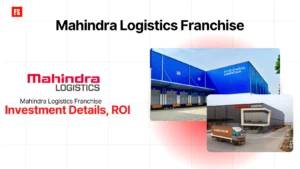If you’re looking for a franchise opportunity with a trusted and established brand in India, then the Patanjali franchise might be the perfect option for you. Patanjali has grown into a well-known name, thanks to its focus on Ayurveda, natural wellness products, and promoting the Indian system of medicine. In this blog, I’ll walk you through what you need to know about the Patanjali franchise, how you can start one, and the different types of franchise models they offer.
Let’s break it down together.
Brand Franchise Details
| Brand Name: Patanjaji |
| Founder: Ramdev, Balkrishna |
| Founded year: January 2006 |
| Headquarters: Haridwar, Uttarakhand, India |
| Products: Ayurvedic medicine, Consumer goods, Healthcare, Personal care, Cosmetics, Cleaning agents, Beverages, Fashion, Foods |
| Number of employees: 6,395 (As record of Nov 2023) |
| Subsidiaries Company: Patanjali Foods, Patanjali Paridhan, Patanjali Renewable, Herboved, Advance Navigation and Solar Technologies, Patanjali University |
Why Consider a Patanjali Franchise?
Patanjali franchise brand is more than just a brand; it’s a movement led by Baba Ramdev, Balkrishna aiming to bring ancient Indian medical sciences and natural products to the forefront. The company has earned the trust of millions of people due to its dedication to promoting wellness through natural, Ayurvedic products. Whether it’s personal care items, grocery products, or wellness services, Patanjali franchise brand caters to a broad market.
If you believe in natural health systems and want to contribute to promoting holistic well-being, a Patanjali franchise could be the right business for you. Plus, you’ll be backed by a highly reputable brand with a massive customer base.
Also read this: How to Apply for MedPlus Franchise? ROI & Investments
Types of Patanjali Franchise
Patanjali franchise brand offers a few different franchise models, depending on the scale and type of wellness services you want to offer. Here are the main options:
- Residential Centers (IPD): These are full-service wellness centers that provide in-patient care. They offer comprehensive treatment programs in a residential setting. You’ll need a minimum of 25 residential rooms and various therapy rooms, including facilities for yoga, hydrotherapy, and physiotherapy. This setup is ideal for hotels, resorts, or wellness centers with accommodation facilities.
- Non-Residential Centers (OPD): These are outpatient care centers where individuals can access therapies without staying overnight. There are two subtypes here:
- District Centers (Type A): These are large wellness centers that cover about 10,000 square feet, offering a range of therapies like colon therapy, hydrotherapy, and physiotherapy.
- Mega Store Non-Residential Centers (Type B): These are smaller setups located within Patanjali Mega Stores, covering around 2,000 square feet. They provide outpatient services in a convenient, store-like setting.
Investment Requirements of Patanjali Franchise
The investment amount for a Patanjali franchise can vary greatly depending on the type of center you choose. For instance, opening a Residential Center will naturally require a larger investment due to the need for residential rooms, therapy sections, and various facilities. On the other hand, a smaller Non-Residential Center within a Mega Store (MS-OPD) will require less capital but still offers a great opportunity to be part of the Patanjali brand.
Here’s a rough estimate of the space and infrastructure required for each type of franchise:
- Residential Center (IPD): 25 residential rooms, 10 therapy rooms, yoga halls, a dining hall, and other wellness facilities.
- District Center (OPD): Around 10,000 sq. ft. of space with 12 therapy rooms, dispensary, and indoor yoga area.
- Mega Store Non-Residential Center (MS-OPD): About 2,000 sq. ft. of space with therapy rooms, a doctor’s office, and a small yoga hall.
Make sure you also account for staffing costs. Each center requires qualified therapists, doctors, and support staff, all trained by Patanjali to ensure they follow the company’s standards and practices.
| Franchise Type | Investment Amount (INR) | Space Required | Staff Required | Additional Costs |
| Residential Centers (IPD) | ₹2–₹5 Crore | 30,000–50,000 sq ft | 45 | Yoga space, therapy rooms, hydrotherapy, dining hall |
| District Centers (Type A) | ₹1.5–₹3 Crore | 10,000 sq ft | 42 | Therapy rooms, mud bath area, yoga hall |
| Mega Store Centers (MS-OPD) | ₹50 Lakh–₹1 Crore | 2,000 sq ft | 10 | Reception area, therapy rooms, yoga hall |
Requirements & Manpower Details for Patanjali Franchise
If you’re considering opening a Patanjali franchise, it’s important to know about the basic requirements for the center and the staff you’ll need. Patanjali offers different types of centers, including Residential Centers (IPD) and Non-Residential Centers (OPD), each with its own specific requirements.
Residential Centers (IPD)
Residential Centers provide a holistic healing experience where patients stay on-site. Here’s what you’ll need:
Space and Facilities
- 25 Residential Rooms: Each room should be at least 300 sq ft with an attached bathroom.
- Doctors’ Rooms: 2 rooms of about 170 sq ft each.
- Therapy Rooms: 10 therapy rooms of 170 sq ft, designed for various treatments.
- Yoga Space: Indoor yoga hall (5000 sq ft) and outdoor yoga space (10,000 sq ft).
- Hydrotherapy & Physiotherapy: Rooms between 400–500 sq ft for both male and female patients.
- Mud Bath Area: Open space for mud baths, with attached bathrooms (300 sq ft).
- Reception & Dining Hall: Reception area (500 sq ft) and dining space for guests (2000 sq ft).
- Additional Amenities: Parking area, swimming pool (3000 sq ft), laundry facility, storage rooms, and a mega store (400 sq ft).
Manpower Requirements
Running a Residential Center requires a team of around 45 staff members. Here’s an overview:
- Doctors: 2 Patanjali-trained doctors.
- Therapists: 12 male therapists and 12 female therapists, all trained by Patanjali.
- Yogacharya: 1 yoga instructor.
- Front Office: 3 receptionists to manage guest queries and handle the front desk.
- Housekeeping: 4 staff members to maintain cleanliness.
- Sales & Store Management: 2 sales staff and 1 storekeeper.
- Support Staff: 2 security personnel, 2 laundry staff, and 4 kitchen/dining staff.
Non-Residential Centers (OPD)
These centers provide holistic treatments without overnight stays. You can open a District Center or a smaller MegaStore Center (MS-OPD).
District Centers (Type A)
- Total Space: Around 10,000 sq ft of covered area.
- Doctors’ Rooms: 2 rooms (250 sq ft each).
- Therapy Rooms: 12 therapy rooms (250 sq ft each).
- Yoga Space: Indoor yoga hall starting from 2000 sq ft.
- Hydrotherapy, Physiotherapy, and Mud Bath Areas: Rooms between 400–500 sq ft.
- Reception & Store: Reception area and a store space (375 sq ft).
Manpower for District Centers
Around 42 staff members are required for a District Center:
- Doctors: 2 doctors trained by Patanjali.
- Therapists: 12 male therapists and 12 female therapists.
- Yoga Instructor: 1 Yogacharya.
- Front Office & Housekeeping: 3 receptionists and 4 housekeeping staff.
- Sales & Store Management: 2 sales staff and 1 storekeeper.
- Support Staff: 2 security personnel and 2 kitchen/dining staff.
Mega Store Centers (MS-OPD)
These centers are located inside Patanjali Mega Stores, with a minimum space requirement of 2000 sq ft.
- Doctors’ Room: 1 room (170 sq ft).
- Therapy Rooms: 4 therapy rooms (170 sq ft each).
- Yoga Hall: A yoga hall starting from 500–700 sq ft.
Manpower for Mega Store Centers
The MS-OPD centers typically need a smaller team:
- Doctors: 1 Patanjali-trained doctor.
- Therapists: 2-3 male and 2-3 female therapists.
- Front Office: 1 receptionist.
- Housekeeping & Sales: 2 housekeeping staff and 1 sales staff.
How to Apply for a Patanjali Franchise?
If you’re ready to take the next step and apply for a Patanjali franchise, here’s what you need to do:
- Choose the Type of Franchise: Decide whether you want to open a Residential Center (IPD), District Center (OPD), or Mega Store Non-Residential Center (MS-OPD).
- Ensure You Meet the Space Requirements: Make sure you have the necessary space and infrastructure before you apply.
- Submit an Online Application: Go to the Patanjali Wellness website and fill out the application form. You’ll need to provide details about your location, space, and intended franchise type.
- Prepare the Necessary Documents: You will need ownership proof (or lease documents), registration documents (like GST, NOC), and photographs of your proposed facility.
Key Documents Required for Application
Here are the main documents you’ll need to have in hand when applying for a Patanjali franchise:
- Ownership proof or lease documents
- Registration documents (Shop Act, GST)
- Specific approvals or licenses
- Photographs of the proposed space (front, rooms, therapy areas, etc.)
Make sure your proposed space complies with the guidelines Patanjali franchise brand provides, especially when it comes to the size and layout of therapy rooms, yoga spaces, and other wellness areas.
Why Patanjali brand?
By becoming a Patanjali franchise brand, you’re joining a mission to bring natural, holistic health solutions to people all over India. You also get the benefit of being associated with a highly recognized brand that has deep customer loyalty. Plus, Patanjali franchise brand provides full training for your staff and offers continuous support to help you succeed.
Final Thought
If you’re someone who believes in natural healing and wants to make a positive impact on people’s health, the Patanjali franchise is a great opportunity. Whether you choose to open a large Residential Center or a smaller OPD center within a Mega Store, you’ll be part of a brand that’s leading the way in Ayurveda and wellness.
So, what are you waiting for? If you think this franchise is the right fit for you, start your application process today!
PS: Please help me improve my content, share your feedback by clicking any of the emojis below 👇
Frequently Asked Questions (FAQs)
The investment for a Patanjali franchise can vary based on the type of center:
Residential Centers (IPD): ₹2–₹5 Crore
District Centers (Type A): ₹1.5–₹3 Crore
Mega Store Centers (MS-OPD): ₹50 Lakh–₹1 Crore
The space requirement also depends on the franchise type:
Residential Centers: 30,000–50,000 sq ft
District Centers: 10,000 sq ft
Mega Store Centers: 2,000 sq ft
This depends on the space available and Patanjali’s approval. You can consult the Patanjali team for guidance on combining franchise types.
The setup time varies depending on the type of franchise and the size of the facility. On average, it can take between 3 to 6 months to get a Patanjali franchise fully operational.
The ROI can vary based on location, type of franchise, and local demand. Patanjali franchises generally have a strong profit margin due to the brand’s popularity and established customer base.








Pingback: How to Start TumbleDry Franchise? Investment, Royalty & ROI